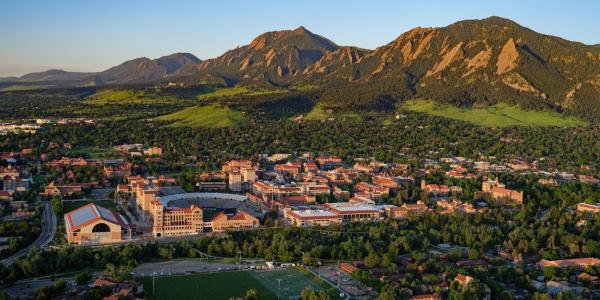The tonnage is tallied, and CU Boulder’s waste diversion rate eclipsed 50 percent for the first time in school history during the 2018 fiscal year, with the university recovering, recycling and reusing more waste than was sent to landfills.

Students sort through recycled material in the Recycling Center at CU Boulder.
CU Boulder’s Zero Waste Partnership released the waste diversion metrics this week, providing an analysis of campus reuse, recycling, composting and landfill statistics. CU Boulder achieved a waste diversion rate of 51.3 percent, up from 48.2 percent for the 2017 fiscal year and up from 43.7 percent just three years earlier.
The campus diverted 3,161 tons of waste from landfills through the combined efforts of stakeholders from across campus. CU Boulder, meanwhile, landfilled fewer than 3,000 tons (2,999) for the first time since reporting began in the 2001 fiscal year.
The CU Boulder diversion rate far exceeds statewide and national diversion rates.
“From our student-led Environmental Center to Housing and Dining Services to Athletics to Facilities Management, departments across our campus are leading and innovating to drive CU Boulder toward a zero-waste future,” said Ed von Bleichert, chair of the Zero Waste Partnership Board of Directors and sustainability and resiliency program manager for the Vice Chancellor’s Office of Infrastructure and Sustainability.
“There is more progress to be made, and this type of collaboration will ensure that we continue to make great strides and make a positive impact with our ultimate aim of a zero-waste campus.”
CU Boulder’s Zero Waste Partnership includes members representing a wide range of stakeholders, with the aim of ensuring that best practices are shared across campus departments and that campus reuse, recycling and composting efforts are coordinated. The partnership is guided by a board that reports to Vice Chancellor for Infrastructure and Sustainability David Kang and Vice Chancellor for Student Affairs Christina Gonzales.
Other key metrics released by the partnership include:
- CU Boulder reduced the amount of waste sent to landfills by 5.6 percent from 2017.
- The amount of material diverted from landfills has increased by 244 percent since CU Boulder began reporting metrics in FY 2001.
- Facilities Operations organics and wood diversion increased by 59 percent in FY 2018, with a full year of operations at the Kittredge Loop diversion site. A new East Campus diversion site that became operational at the end of FY 2018 added a new site dedicated to waste diversion for Facilities and Housing staffs, which should contribute to continued improvement of this rate.
- Scrap metal collections by Facilities Operations and Housing and Dining Services rose 66 percent.
- Organic waste diverted from campus dining facilities rose five percent to 530 tons.
- Campus compost collections (including trees/yard waste, wood waste, food and restroom waste) have more than tripled in the past seven years, increasing to 1,525 tons in FY 2018 from 436 tons in 2011.
New and ongoing campus initiatives that have contributed greatly to CU Boulder’s recent waste diversion gains include:
- During residence hall move-out in the spring, students partnered with staff from Housing and Dining Services and other campus departments to capture a record 44.7 tons of reusable items that were donated.
- Facilities Management staff and CU Environmental Center students who work at the Grounds and Recycling Operations Center assisted Wolf Law with an effort to remove and recycle 7,000 large, hard-spine books, diverting 21 tons of waste from the landfill.
- CU Recycling serviced a record number of campus events, with major events such as home football games averaging 83.7 percent waste diversion inside the stadium thanks to the continued efforts of Ralphie’s Green Stampede.
- Added compost collections to six more campus buildings, bringing the total number of buildings on campus where compost is collected to 38. Two new exterior compost collection sites were also added to graduate and family housing areas.
“We’re focused on continued expansion of our composting efforts, adding more and more collection sites and working with campus partners to educate our community about things like decreasing food waste and disposing of different kinds of waste properly,” von Bleichert said. “I’m continually impressed with the passion of our campus community for contributing to these efforts.”



